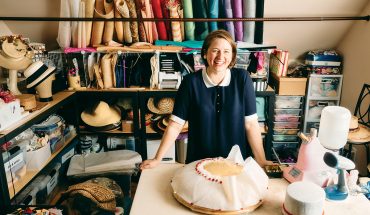Since Julia Child would have been 100 this year, America’s been dishing over our great goofy chef. She inspired so many that everybody seems to have and wants to tell her own Julia story. My mind’s eye summons my husband about 15 years ago, tipsy after a sexy, gluttonous vacation lunch in Cambridge, Mass., dancing down what we thought to be her street, giggling and singing out in a high-pitched voice, “Oh, Julia…come out to see us. We need to meet you, and we have brought you a delicious piece of stinky cheese!”
We’re cheesy; it’s true, and no, Julia Child did not appear. By then, the banquet that was her life was in its final course; she was living mainly in Santa Barbara, Calif. Yet my gut and my heart tell me that our kind of romantic, sensual silliness was just the sort of caper that Child and her husband of almost 48 years, Paul, might have pulled when they were young.
We pick our patron saints, the people who awaken something in our souls and whose example lights our life’s path. Some we meet only in passing, through books, music, or other forms of art. Julia and Paul Child have been the best, most effective marriage counselors Bob Geolas and I have never met, and for nearly two decades Child’s seminal cookbook, Mastering the Art of French Cooking, has been a deliciously effective guide to creating and maintaining the complex emulsion of dreams, desires, points of view and personality quirks that make our marriage.
But first, theirs: the Childs were anything but average Americans. They were spies who met while working for the Office of Strategic Services during World War II. He, a career diplomat older by a decade; was an artist, photographer and skilled writer. She, from California blue blood and money, had ditched a boring PR job in New York for patriotic adventure in the Far East.
Friendship forged over a shared appetite for exotic food roiled to a lifelong passionate love. It began in Kandy, Ceylon, now called Sri Lanka, and how perfect to imagine them falling in love in a place named for a sweet confection and tea. They married in 1946; in 1948, Paul was transferred to a post at the American Embassy in Paris. Sole meuniere in Rouen, Julia’s very first lunch in France, awakened her palate, her perspective and altered the trajectory of their lives. Their food/love story is well-known and well-told in several books and the film Julie and Julia.
Julia Child’s passion for food was forceful, but success wouldn’t have happened without Paul Child’s passion for his wife. Through it all, he was her best fan, right arm, taste-tester, personal assistant and PR agent. Not only did he write her love poems and keep her laughing, he also arranged her kitchen, installed the peg boards and hung the copper pots. From his photographs, every illustration in that cookbook was made. When fame arrived for his wife, Paul Child gladly moved her career to the center of their plate.
Over the last two decades, my husband and I have talked often about how the Childs cooked, lived and loved. In the beginning of our own story, though, we didn’t know theirs. We couldn’t get past our own love — and the potatoes.
Wooed from our stoves
Common ground, like true love, can be a place you’ve never actually visited. We met one summer night in New York City, and on the next, discovered that we each believed some essential part of our lives awaited in Paris.
Another key ingredient was that we both came from families where cooking was done well and held in high esteem. From the first dates, we wooed each other from our stoves, and we can trace our courtship in dishes — veal piccata, pastitsio, roasted cornish hens with bourbon-butter glaze and chocolate mousse.
In September 1993 we flew to Paris, and those 10 days transformed us in innumerable and enduring ways. There we realized we wanted and needed to spend the rest of our lives together. There we discovered a beauty in a way of living that neither had seen nor imagined. Or tasted. When we got back home, we planted gardens. And we got seriously into French cuisine. That same year Alfred A. Knopf, Inc. re-released Child’s 1961 classic cookbook, so Bob gave me Mastering the Art of French Cooking for Christmas.
The inside cover and first eight pages are rippled and mauve-colored from wine stains. Set the book on the counter, and it naturally falls open to page 523, Gratin Dauphinois. We began picking our way through recipes whenever inspiration hit. Soupe a l’oignon, boeuf bourguignon, and steamed mussels. I can still see my young husband holding up his first and wildly successful attempt at the flourless chocolate marquis cake, which we devoured like a pair of street dogs.
Soon we scoured Raleigh for a madeleine pan, which led to a rainy afternoon, the scent of almond and powdered sugar on fingertips. The pathway between the kitchen and bedroom back then was often short, sweet and well-tread. We’d lie in bed, plotting meals and dinner parties, dreaming about the next meal in France. Yet that time in our relationship and then marriage was so much more than that. Love’s palate is discovered, refined and nurtured in the kitchen, at the table, even at the grocery store. You learn about yourself and each other in what you are willing to risk or to try.
Julia Child’s book was a collection of recipes that provided a collection of experiences that taught us to enjoy life’s pleasures small and large. And the master recipe is this: The act of creating something for each other says, “You are worth my time and effort, and in doing this, I want to grow towards you.”
For my 30th birthday, Bob booked us a class at Le Cordon Bleu. The speed and difficulty of their lesson was mind-boggling. In less than a minute, they taught us to pare potatoes, and we were so ill-behaved and giggly in class I thought we might get tossed out. Afterwards, we lunched on oysters and champagne at Brasserie Flo and felt worldly as a pair of OSS spies. Back in Raleigh, Bob decided he preferred scalloped potatoes, and made his first dish of potatoes dauphinois. When he sunk the spoon through the perfectly crusted top, I thought he’d created the perfect dish that tasted like our love.
Blessed table expanded
Years passed, our blessed table expanded. We had four children. Our first baby, whom we named Paris, temporarily scorched the cooking routine.
I remember the frustration those first months, trying to follow a recipe, but being pulled away too often. Many meals were mistakes; Julia’s sauteed spinach and omelets saved us. Once Bob stayed home so I could have some time to myself. Near dinner I arrived to a quiet, clean house and roast chicken with herbes de provence in the oven. I kissed him and ungraciously admitted I wasn’t sure whether to say “Thank you” or something else that ended with “You,” but we laughed, dined and loved like Napolean and Josephine that night.
This chapter of our story has been a fantastic, stupefying, hilarious, invaluable and exhausting decade of macaroni and cheese, diapers and career highs and lows. I wouldn’t trade a moment, though fabulous meals and soirees gave way to cook outs and kid parties. Still we managed to slip off to Paris, and no holiday came or went without my husband’s steadfast love and potatoes.
During these years I read the biographies on the Childs. In the hard times, when I missed Raleigh, or felt chronically pregnant or believed my career was lost at sea, the story of a woman who didn’t bloom until she was 50 and that of a couple who spent their lives dedicated to helping each other discover the fullest expression of themselves was brain and soul food.
The baby years are now past, and to our great delight, the children are joining us in the kitchen. Since moving back to Raleigh last spring, we have had more dinner parties than we did in the past decade. We are living, I think, not unlike the Childs did. Time has taught us the goal isn’t the perfectly rendered dish, but the act of savoring every moment, laugh and taste.
Recently, we gave some younger friends cooking lessons. I began with the wife and roasted chicken. Soon, the men repaid us with a dinner of slow-roasted ribs. When I came in the door, I smelled the unmistakable, heart-rending scent of potatoes dauphinois, which made me tear up. My husband.
He smiled and said, ‘He needs to know how to cook potatoes.’
That’s the greatest chef’s secret, which Julia Child knew and lived. Like love, the power is in sharing.
Had we the chance to meet the Childs, I might have burned up precious moments talking food. Now, I’d just kiss Julia’s cheek, while squeezing my husband’s hand and with a knowing wink, whisper, “Thanks for the recipe.”

![Paul Child [& Wife]](https://waltermagazine.wpengine.com/wp-content/uploads/2012/10/Julia-and-Paul-Child1-300x200.jpg)


